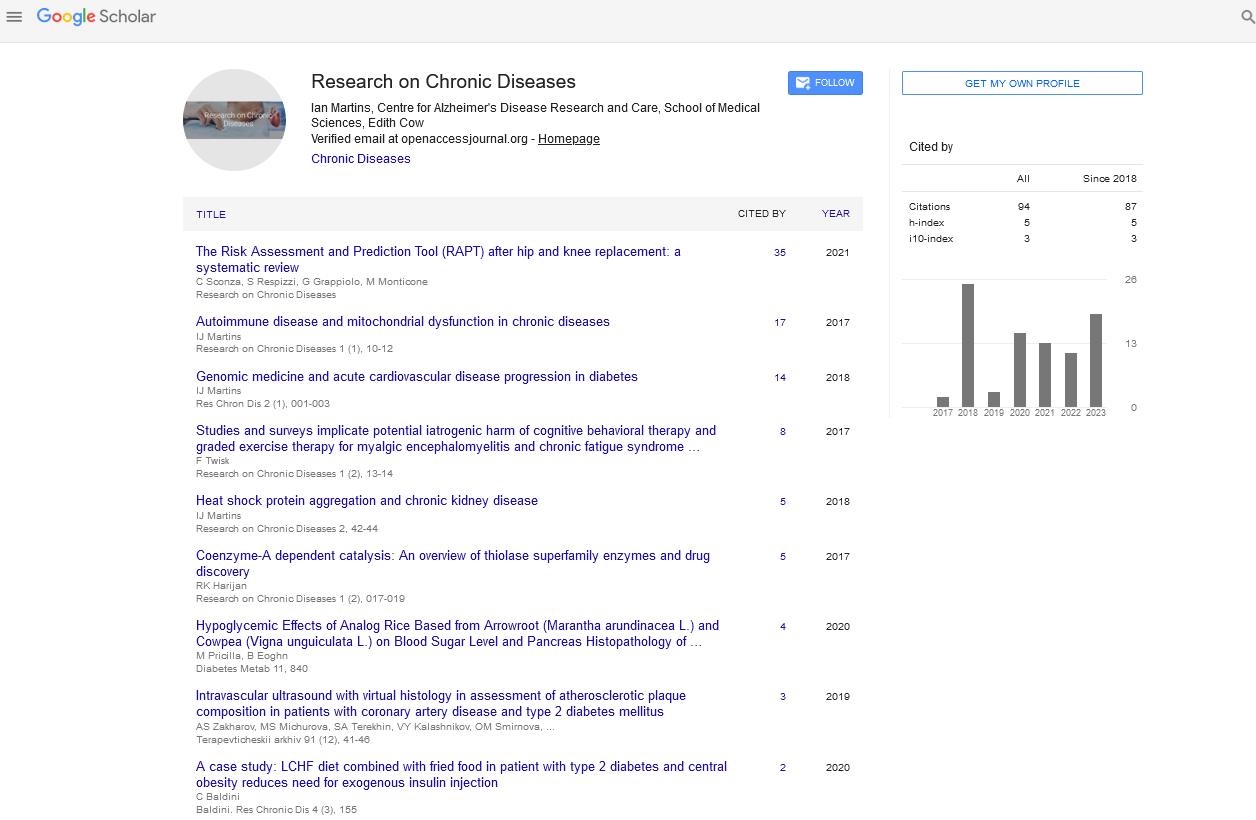Perspective - Research on Chronic Diseases (2024) Volume 8, Issue 3
Unraveling the Mysteries of Autoimmune Diseases: Understanding, Managing, and Thriving Despite the Challenges
- Corresponding Author:
- Mitchell Collins
Department of Immunology,
University of Norway,
Drammen,
Norway
E-mail: mitchell@gmail.com
Received: 04-May-2024, Manuscript No. oarcd-24-134057; Editor assigned: 08-May-2024, PreQC No. oarcd-24-134057 (PQ); Reviewed: 22-May-2024, QC No. oarcd-24-134057; Revised: 07-Jun-2024, Manuscript No. oarcd-24-134057 (R); Published: 14-Jun-2024, DOI: 10.37532/OARCD.2024.8(3).194-195
Introduction
Autoimmune diseases, a diverse group of disorders characterized by abnormal immune responses against the body’s own tissues, present a complex and multifaceted challenge to global health. From the joints ravaged by rheumatoid arthritis to the nerves assaulted by multiple sclerosis, autoimmune diseases manifest in myriad forms, affecting virtually every organ system and presenting a wide range of clinical manifestations. Despite their heterogeneity, autoimmune diseases share common underlying mechanisms, including dysregulation of the immune system, genetic predisposition, environmental triggers and inflammatory processes. In this article, we embark on a journey through the intricate landscape of autoimmune diseases, exploring their causes, clinical manifestations, diagnostic approaches, treatment modalities and strategies for empowerment and resilience in the face of adversity.
Description
Understanding autoimmune diseases
Autoimmune diseases arise when the immune system, tasked with defending the body against foreign invaders such as viruses, bacteria and toxins, mistakenly targets healthy cells and tissues as if they were pathogens. This aberrant immune response leads to inflammation, tissue damage and dysfunction in affected organs, giving rise to a diverse array of symptoms and clinical presentations. While the exact triggers of autoimmune diseases remain elusive, a combination of genetic susceptibility, environmental factors and dysregulation of immune pathways is believed to play a central role in their pathogenesis.
Common autoimmune diseases
Autoimmune diseases encompass a broad spectrum of conditions affecting virtually every organ system in the body. Some of the most common autoimmune diseases include rheumatoid arthritis, Systemic Lupus Erythematosus (SLE), multiple sclerosis, type 1 diabetes, hashimoto’s thyroiditis, graves’ disease, inflammatory bowel disease (Crohn’s disease and ulcerative colitis), psoriasis and autoimmune hepatitis. Each autoimmune disease is characterized by distinct clinical features, underlying mechanisms and target tissues, but all share a common thread of immune-mediated inflammation and tissue damage.
Pathophysiology and underlying mechanisms
The pathophysiology of autoimmune diseases involves a complex interplay of genetic, environmental and immunological factors that contribute to the breakdown of self-tolerance and the initiation of autoimmune responses. Genetic predisposition plays a significant role in susceptibility to autoimmune diseases, with certain alleles of the Human Leukocyte Antigen (HLA) complex and other immune-related genes associated with increased risk. Environmental triggers, including infections, dietary factors, hormonal changes and exposure to toxins, can trigger or exacerbate autoimmune responses in genetically susceptible individuals. Dysregulation of immune pathways, including activation of autoreactive T and B lymphocytes, production of autoantibodies and release of pro-inflammatory cytokines, drives the inflammatory processes underlying autoimmune diseases.
Clinical manifestations and diagnosis
The clinical manifestations of autoimmune diseases are diverse and may vary widely depending on the specific condition, affected organs and disease activity. Common symptoms include fatigue, joint pain, muscle weakness, skin rashes, fever, weight loss, gastrointestinal disturbances, neurological symptoms and endocrine abnormalities. Diagnosis of autoimmune diseases often relies on a combination of clinical assessment, laboratory tests, imaging studies and histological evaluation of tissue samples. Blood tests for autoantibodies, inflammatory markers and organ-specific antibodies can help identify underlying autoimmune processes, while imaging studies such as ultrasound, MRI or CT scan may reveal structural abnormalities or evidence of inflammation in affected organs. Additionally, biopsy of affected tissues, such as synovial tissue in rheumatoid arthritis or skin biopsy in lupus, may be performed to confirm the diagnosis and guide treatment decisions.
Treatment modalities
The management of autoimmune diseases aims to suppress autoimmune activity, reduce inflammation, alleviate symptoms and preserve organ function through a combination of pharmacological and non-pharmacological interventions. Pharmacological therapies include immunosuppressive medications such as corticosteroids, Disease-Modifying Anti-Rheumatic Drugs (DMARDs), biologic agents and targeted immunomodulatory agents that selectively inhibit specific immune pathways involved in disease pathogenesis. Non-pharmacological interventions may include lifestyle modifications such as stress management, regular exercise, healthy diet and smoking cessation, as well as complementary and alternative therapies such as acupuncture, yoga and dietary supplements. Additionally, patient education, selfmanagement strategies and regular monitoring of disease activity are essential components of longterm management and optimization of outcomes in autoimmune diseases.
Empowerment and resilience
Living with an autoimmune disease requires resilience, adaptability and a proactive approach to self-care. Empowering individuals with knowledge about their condition, treatment options and selfmanagement strategies is essential in promoting autonomy and improving outcomes. Developing coping strategies to manage symptoms, navigate healthcare systems and advocate for one’s needs can help individuals regain a sense of control over their lives and promote well-being in the face of chronic illness. Building a strong support network of family, friends, peers and healthcare providers can provide invaluable emotional and practical support along the journey. Moreover, fostering resilience, cultivating positive coping mechanisms and embracing a holistic approach to wellness can empower individuals to thrive and flourish despite the challenges posed by autoimmune diseases.
Conclusion
Autoimmune diseases, complex and multifaceted disorders of the immune system, present significant challenges to health, well-being and quality of life for millions of individuals worldwide. By gaining a deeper understanding of their underlying mechanisms, clinical manifestations, diagnostic approaches and treatment modalities, we can better equip ourselves to address the complex needs of affected individuals and optimize outcomes. Moreover, by fostering empowerment, resilience and a sense of community among individuals living with autoimmune diseases, we can support them on their journey to wellness and inspire hope for a brighter future. Together, let us stand united in our commitment to raising awareness, advancing research and improving the lives of those affected by autoimmune diseases.
